 Note to readers of this blog:
Note to readers of this blog:
The text that follows is extensive. It is a reply to statements made in recent days by the BBC’s correspondent in Havana, Mr. Fernando Ravsberg, as part of statements he made in an interview with his fellow countryman, journalist Emiliano Cotelo, during Ravsberg’s recent stay in Madrid. The complexity of the topics covered there and my total disagreement with Ravsberg’s views prevent me from expressing myself in a shorter post. I warn you, then, that those who enjoy brevity in writing do not get mired in reading this post and forgive the inability of this blogger to remain silent before such iniquities.
Miriam Celaya González
Open Letter to the BBC in London
I’m just one among millions of earthlings who use the Internet. That said, in my capacity as an alternative Cuban blogger, my access to the net is rather limited and sporadic. However, I feel a sincere respect for information professionals worldwide, and consider the BBC a serious and competitive agency. It is just because of this that I cannot understand how it is possible that under such prestige and tradition there is a chance for the defense of such deceitful and unscrupulous “journalists” who, violating every principle of ethics in the profession, are engaged in misinforming the world, distorting the reality of a nation and, incidentally, providing a (free?) service to the longest dictatorship known in the Western world.
Uruguayan journalist Fernando Ravsberg, a BBC Havana reporter, was interviewed recently in Madrid by Emiliano Cotelo concerning the controversial dialogue initiated between the Cuban government and the top hierarchy of the Catholic Church in Cuba. Ravsberg’s answers, at times ambiguous and always highly partisan, reflect the contempt he feels for this country and for Cubans, as well as the profound ignorance of Cuban history and the aspirations of its people. Ravsberg is not the essence of a journalist, but a propagandist of the Cuban regime and, as such, an uncompromising critic of the dissent and civic outbreak that has started to gain strength in society, sectors very harshly persecuted and harassed in the Island that are struggling to maintain the economic, political, and social rights of all Cubans despite the harassment and repression of which they are victims, while “informers” such as the correspondent in question either look the other way or prefer to reinforce the official discourse by fabricating an imagined reality.
What is that “Cuba” that Ravsberg reports about, and what benefits does he get from it? Only he could answer this. We have already read on other occasions his very personalized Cuban scenario analysis and his peculiar versions in interviews he has done, so it is not so surprising this time that the brilliant correspondent of the BBC paint us a Cuba that Cubans themselves do not know and, to top it all, that he should exceed his ominous functions. It often happens that some clever foreigners like him need just a little bit of time in the Island and a couple of questions that they claim to ask around to master Cuban issues. It’s as if the tropics overheat their brain and they lose the ability to discern. Now Ravsberg not only misrepresents the Cuban reality, but also comes out as an expert in sociology and social psychology of Cuba, mainly in terms of politics and religion. An analysis of such nonsense would be extremely long, so I think it’s best to make only some remarks in order to correct a little the compass of this disoriented reporter, who, as the old popular saying goes, can’t see the forest for the trees.
The BBC correspondent in Cuba states that the government does not give value to dissidence “because it receives money from abroad.” I don’t know if this government has provided Ravsberg with the evidence of such emoluments received by “the dissidence”, since the Cuban people have never been shown any concrete evidence of this, unless we take into account the unilateral declarations of the official beefeaters (and unofficial ones, such as Ravsberg). On the other hand, who can be classified as “dissident” to the clever correspondent? In general, in that wide tuning fork in Cuba are included the opposition parties as well as the independent journalists, the alternative bloggers and whoever does not abide by government guidelines. If this is the case, I feel authorized to deny such a claim: at least one large group of bloggers who are close to me and I, among other “dissidents” do not receive any money from abroad. The Cuban government, on the other hand, not only has gotten all kinds of resources for decades (which it still receives and squanders) but –in addition- applies an abusive tax on relatives’ remittances and on any other kind of income Cubans may receive from abroad. With this in mind, it follows that the government also benefits from the alleged foreign funds destined to the internal dissidence, as I’m sure Mr. BBC Correspondent knows.
The Cuban government does not consider dissidence, not exactly for “receiving money from abroad,” but because dictatorships do not accept any alternative demonstration, whether colored by politics or not. The Cuban government does not recognize the opposition parties nor independent journalists, the various alternative civil society associations or bloggers, and we are not even an organization. The weakness of totalitarian regimes lies, nevertheless, in that absolute monopoly over society, over information, and over individual fear, so that all alternative event or trend that may involve a breach in the system becomes “dissidence” and must be demonized. Thus, according to the official discourse (and curiously, in that of “journalists” such as this Uruguayan gentleman) all dissidents “are mercenaries in the service of a foreign power that attacks, blockades and is hostile to us”.
Ravsberg tries to underestimate the international pressure on the dictatorship of the Island following the death of Orlando Zapata by arguing, “except the United States government, no other government condemned the Cuban government for the death of Zapata.” The criticism from Mexican and European parliaments, as well as those of civil society groups, artists and intellectuals from many countries, do not seem relevant to one who, paradoxically, employs Uruguay as an example of democratic tradition. Not even the discrete statements of the Secretary General of the United Nations, who publicly grieved over the death of Orlando Zapata, are mentioned by Ravsberg. His own discourse betrays his distinct sense of democracy: if governments aren’t the ones to directly produce criticism, international pressure does not exist.
Another issue relates to considerations about Cuban politics. Ravsberg tries to convince public opinion that in Cuba there has been a change in president that supposes some difference or change in the Cuban process. In an absurd simile, he makes a comparison between the Cuban dictatorial succession process (a real fingering of the candidate) and Uruguayan democratic elections that placed –via the polls- Mujica in power, after Tabaré Vázquez. Big deal, Ravsberg tells us, both (Tabaré and Mujica) are representatives of the Frente Amplio, this implies that the change in representatives in the Cuban dictatorship is “somewhat similar to what just happened in Uruguay”, since there is a different person in power in each case. One must be very stupid or disrespectful of the intelligence of others to hold such a belief.
Ravsberg’s views walk the same tightrope during the referenced interview, when he asserts “there has been a series of changes in Cubans’ access to hotels, which resulted in tourist hotels occupation rate of 10% for Cubans last summer, which also indicates that certain sectors have good incomes”. And also the unusual mockery on the Cuban people by saying “there have been a lot of changes in the country that people seem not to follow: economic changes, recognition of rights of citizens, for example, internet access, which was banned to Cubans for years, has just been legally ratified by decree as a right, and Internet cafes were immediately established so that any citizen can check out anything, from the Miami Herald to the BBC World and even El Espectador. These are key steps, steps that are not taken into account, but that mean, for example, that the Cuban government accepts, for the first time, to end the information monopoly and to grant access to the world”.
What Ravsberg failed to state is that certain websites cannot be viewed from the cybercafes because the government has “cut offs” that prevent access and, curiously, some of the banned pages are those of the alternative bloggers, which shows that officials show greater fear of the dissemination of news and views of those who are inside the Island than of the entire foreign press, including the one accredited in Cuba. The BBC’s correspondent didn’t clarify that such “rights”, generously granted by the government, will not become generalized, because no salary in Cuba provides enough income to cover the price of lodging in hotels or to afford the luxury to surf the Internet for information, unless there is an alternative income source (not legal), family or friends abroad to cover such expenses, or if the person is a Cuban with a foreign residence permit or with a job contract outside of Cuba. Only thus can Cubans allow themselves such excesses, against the grain of the painfully slow network connections or the questionable hotel service offered. However, each independent Cuban national staying in hotels is so suspect that his stay is carefully controlled by the Ministry of the Interior, with strict monitoring of his spending and the number of times he takes pleasure in these accommodations.
Perhaps a good demonstration of the government’s willingness to end the information monopoly would be to unblock the websites that host the alternative blogosphere (www.vocescubanas.com and www.desdecuba.com, for example), or to allow the right to all those who the official press has offended and discredited through the mass media, to reply, so that ordinary Cubans may get to know all the arguments presented for debate and form their own opinions. Ravsberg cannot ignore that the Cuban press has never published a single one of the documents condemning the government occurring at the national or international level, although it has allowed itself to deride them, so that the people has had only a partial and distorted version of them.
As for the internal repression and harassment that has kept up during seven long years against the Ladies in White, wives of political prisoners of the Black Spring, which the BBC’s correspondent attributes to the indignation of the people against betrayal, is Ravsberg ignoring that the raging hordes that have attacked these defenseless Cubans during their peaceful demonstrations every Sunday are agents of the Cuban government, specifically trained to smack and suppress any demonstration by the alternative civil society, whether they are opponents or not? Mr. Ravsberg is, at best, rude and vulgar when he so candidly states, referring to the talks between the Cuban authorities and the Catholic Church that “there is an antecedent, a few weeks ago when Raúl Castro’s government called on the Catholic Church to inform it that it had authorized the Ladies in White to march freely through the streets again.” In fact, the Ladies never asked nor needed government permission to march for the release of their relatives who are imprisoned for exercising their freedom of expression to disclose truths that Mr. Ravsberg pretends to ignore; the streets are a place they have earned with their reputation and courage, just like they have earned the respect and admiration of all decent Cubans. They conquered the streets on their own.
As for the Catholic Church, which Mr. Journalist regards as if it were a sect of pariahs and fugitives and which he considers “a weak institution”, he clarified that the religious institution is the strongest in Cuba, only that Catholicism a la Cuban is not similar to that practiced in Uruguay, or, say, Spain. In Cuba, the syncretic cults of African origin have not surpassed Catholicism, but they have given rise to a particular religious amalgam in which it is difficult to see where the contributions of one or the other belief begin or end; they have imprecise boundaries because, for example, in everyday practice, the followers of the cults of African descent baptize their children in Catholic churches following the traditional Christian ritual, they place offerings in those very churches and show respect to both God and Oloffi. On the other hand, some call themselves Catholic and make offerings to the orishas, or consult the babalawo. The Social Science scholars in Cuba have never ventured to say that “the majority of Cubans profess an Afro-Cuban faith known as Santería”, as the audacious Ravsberg dares to assure us. Judging by how he sets out the issue, he seems to have spent much time in Cuba doing a survey of high statistical value to ensure this (the National Institute of Anthropology has lost so much for not having him on its staff!), as well as to maintain that the Cuban Catholic Church “is not a strong institution in the sense of having many followers, many supporters. It is a minority religion” and, in spite of that, it has high social influence ” (what, then, is this influence based on?).
I don’t want to finish without proposing to correspondent Ravsberg that it might be advisable to spend a little less time sightseeing in Havana and immerse himself in Cuban History texts in order to avoid issuing disparate comments; willful ignorance is not an ornament, so displaying it so shamelessly is not nice. When this man says that “Cuba is a country that was practically never independent, when the Spanish colony ended troops from another country entered, the US installed the first president, and later on there was practically no democratic history…” he is missing a rich history as a republic in which strong democratic values were consolidated, plus civil institutions that enabled the birth of a constitution in 1940, the most advanced of its time. Ravsberg ignores that the seeds of Cuban democratic vocation were born in unison with the dawning of a nation, when we were still a colony (as were all the nations of Latin America, including Uruguay), which was refined in the XIX century in the ideas of José Martí, the most democratic of all Cubans. Half a century of dictatorship and latent fear are preventing our people to show it; that is why sometimes Cubans don’t dare to express themselves, that is why when they express themselves freely they are incarcerated, that is why any false correspondent may divulge whatever he pleases about Cuba, as long as what he says is in tune with the government line, or risk losing his accreditation. The day Cuba becomes free, maybe even Ravsberg will be surprised of the democratic vocation of Cubans, but, on that day, he will have to strive to be a real journalist.
Finally, I’m sorry for having overextended my comments on what many might consider excessive attention that the BBC correspondent does not deserve, but it is not about him: We Cubans have already suffered enough damage for over 50 years, and, in addition, have had to remain mute to the offenses and contempt of a parasite of the press. I am not speaking on behalf of Cubans in general, no one has authorized me, nor do I merit it so much, but I speak in my own name because, like the bloggers and independent journalists whom I call my fellow travelers, every day I run the risk of repression for spreading the truths of my country, while Ravsberg’s arrogant insolence waddles with impunity in the midst of my people. I speak, too, because as Mr. Ravsberg knows, the vast majority of Cubans ignores the number of blunders being reported about them by this “journalist”, whom, I’m sure, has been welcomed with the hospitality and the affection of which he is not worthy. I don’t have the authority or qualities to issue guidelines to the BBC, but I am of the view that an agency that was born as far back as 1923 and has provided invaluable services to humanity as a reliable source of information, even during the bloody circumstances of the last century’s world conflagration, should be careful when selecting its correspondents: in the case of Havana, the BBC is paying in cash for the perpetuation of lies. It is disgraceful.
Sorry for your time, I hope that, after all, Fernando Ravsberg is only a small and regrettable error.
11 June 2012
 There are particular stores in Havana to chose from. In some, you will find arts and crafts made by hand. Others are better sorted than the Cuban outlet of Adidas or Zara. This is the case with the “shopping” establishment of Rufino, age 45 and retired because of an illness.
There are particular stores in Havana to chose from. In some, you will find arts and crafts made by hand. Others are better sorted than the Cuban outlet of Adidas or Zara. This is the case with the “shopping” establishment of Rufino, age 45 and retired because of an illness.
 Cuba produces passions, but also pain. I am taking the liberty of reprinting here the comments of some readers, showing how much this island in the Caribbean Sea is hurting.
Cuba produces passions, but also pain. I am taking the liberty of reprinting here the comments of some readers, showing how much this island in the Caribbean Sea is hurting.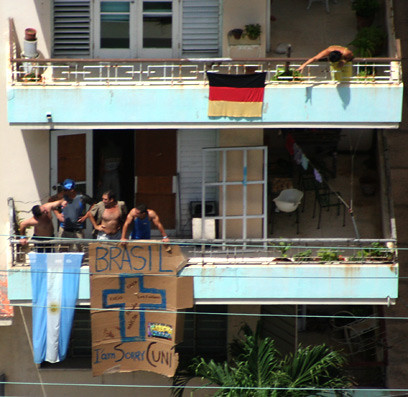
 Sandy Olivera is a young Cuban who, two years ago, emigrated as a political refugee to the United States. His girlfriend remained on this side of the sea. A week ago, he returned to Cuba to marry her.
Sandy Olivera is a young Cuban who, two years ago, emigrated as a political refugee to the United States. His girlfriend remained on this side of the sea. A week ago, he returned to Cuba to marry her. Cubans are outcasts in their own land. Both those who reside in the country, as well as those living abroad. The latter are doubly discriminated against. They cannot invest in the economy because they are citizens of the State, yet when they return to the country they are treated as foreigners.
Cubans are outcasts in their own land. Both those who reside in the country, as well as those living abroad. The latter are doubly discriminated against. They cannot invest in the economy because they are citizens of the State, yet when they return to the country they are treated as foreigners.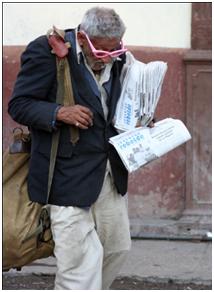 It is fair to acknowledge that foreign investment in Cuba brings benefits to the economy. But by itself it is not the solution for confronting the overwhelming problems.
It is fair to acknowledge that foreign investment in Cuba brings benefits to the economy. But by itself it is not the solution for confronting the overwhelming problems.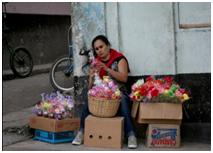

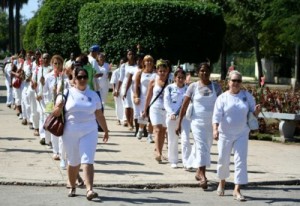
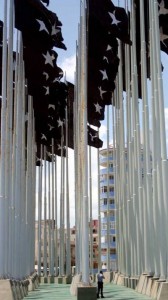
 Note to readers of this blog:
Note to readers of this blog: